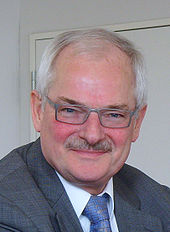Reinhard Kurth
Reinhard Kurth (born November 30, 1942 in Dresden , † February 2, 2014 in Berlin ) was a German virologist and doctor . From 1996 until reaching the age limit in November 2007, he headed the Robert Koch Institute in Berlin, the successor institution of the former Federal Health Office responsible for infectious diseases .
Life
After attending school in Hamburg and Nuremberg (1949–1962) and passing the Abitur (at the Martin-Behaim-Gymnasium ), Reinhard Kurth studied medicine from 1962 to 1968 at the University of Erlangen-Nuremberg, with a minor in philosophy. In 1965 he worked temporarily in Cameroon as a development worker, in 1968 he completed his medical studies with a state examination and doctorate . In 1968/69 Kurth worked as a medical assistant at the city hospital in Ingelheim am Rhein . After his admission as a doctor (1969) he went to the University of Tübingen , where he studied molecular biology and biochemistry until 1971 as a scholarship holder of the Volkswagen Foundation and worked at the Max Planck Institute for Virus Research .
The retroviruses and especially HIV were at the center of his scientific work . From 1971 to 1973 he was a research assistant in the virology department of the Robert Koch Institute, but then moved to the Imperial Cancer Research Fund Laboratories in London . He then headed a junior research group at the Max Planck Society in Tübingen from 1975 to 1980 . In 1976 he completed his habilitation in Tübingen and was appointed private lecturer. In 1980 Kurth was appointed head of the virology department at the Paul Ehrlich Institute in Frankfurt am Main , which he headed as its president from 1986 to 2001, the last five years at the same time as the Robert Koch Institute (RKI). From 1983 he was honorary professor at the University of Frankfurt . Since September 2004 he has also been acting head of the Bonn Federal Institute for Drugs and Medical Devices .
Even after his retirement, Kurth continued to research at the RKI. The main research areas were the functional characterization of the so-called endogenous retroviruses in humans, the development of an HIV vaccine and the investigation of endogenous retroviruses in pigs, which could possibly cause damage to humans in the event of future xenotransplantation of pig tissue or organs.
Kurth repeatedly linked the findings of infection research with other social issues. For example, he called for financially weak countries to be supported in protecting against infection . It is also part of his self-image to inform the general public about health risks, even if the RKI primarily advises the specialist public and politics due to the legal requirements.
Reinhard Kurth has been honored with numerous scientific awards and has been a member of the bioscientific medical class of the Berlin-Brandenburg Academy of Sciences since 1998 . In 2005 he received the Great Cross of Merit of the Order of Merit of the Federal Republic of Germany from Federal President Horst Köhler for special achievements in science and successful work in several federal institutes. The Medical Faculty of the Charité in Berlin awarded him an honorary doctorate in 2006 for “his outstanding services” .
Reinhard Kurth was appointed new Chairman of the Board of Trustees of the Schering Foundation on October 7, 2008 . He appeared in the documentary House of Numbers: Anatomy of an Epidemic in 2009 , in which he commented on the theses of Peter Duesberg , among other things .
Kurth died on Sunday, February 2nd, 2014 after a long and serious illness.
Awards, honors and memberships
- Member of the Berlin-Brandenburg Academy of Sciences and Humanities (1998)
- Great Cross of Merit of the Order of Merit of the Federal Republic of Germany (2005)
- Foreign Member of the American Philosophical Society (2005)
- Honorary doctorate from the Medical Faculty of the Charité in Berlin (2006)
- Member of the Leopoldina (since 2008)
- Johann Peter Frank Medal from the Federal Association of Doctors in the Public Health Service (2009)
Web links and sources
- Literature by and about Reinhard Kurth in the catalog of the German National Library
- Reinhard Kurth, President of the Robert Koch Institute. ( Memento from September 29, 2007 in the Internet Archive ) CV on the website of the Robert Koch Institute
- The virologist and physician Prof. Reinhard Kurth has died. Obituary on rki.de from February 3, 2014
- Advocate of Reason. Obituary in the Berliner Tagesspiegel on February 5, 2014
Individual evidence
- ↑ Reinhard Kurth is the new Chairman of the Board of Trustees of the Schering Foundation. On: idw-online.de from October 8, 2008
- ↑ Video : Dr. Reinhard Kurth's Extended House of Numbers Interview
- ↑ Prof. Reinhard Kurth has died. In: health city berlin. Retrieved March 25, 2020 .
| personal data | |
|---|---|
| SURNAME | Kurth, Reinhard |
| BRIEF DESCRIPTION | German virologist and doctor |
| DATE OF BIRTH | November 30, 1942 |
| PLACE OF BIRTH | Dresden |
| DATE OF DEATH | 2nd February 2014 |
| Place of death | Berlin |
